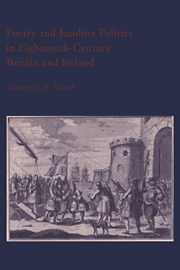Book contents
- Frontmatter
- Contents
- Acknowledgements
- Introduction
- 1 Invasion and xenophobia
- 2 The wee, wee German lairdie
- 3 The codes of the canon
- 4 Jacobite political culture in Scotland
- 5 Jacobite culture in Ireland and Wales
- 6 The demon's light
- 7 The tartan curtain
- Additional works
- Index
- CAMBRIDGE STUDIES IN EIGHTEENTH-CENTURY ENGLISH LITERATURE AND THOUGHT
Introduction
Published online by Cambridge University Press: 23 November 2009
- Frontmatter
- Contents
- Acknowledgements
- Introduction
- 1 Invasion and xenophobia
- 2 The wee, wee German lairdie
- 3 The codes of the canon
- 4 Jacobite political culture in Scotland
- 5 Jacobite culture in Ireland and Wales
- 6 The demon's light
- 7 The tartan curtain
- Additional works
- Index
- CAMBRIDGE STUDIES IN EIGHTEENTH-CENTURY ENGLISH LITERATURE AND THOUGHT
Summary
Historical aims
The aims of this book are threefold. First, it seeks to liberate eighteenth-century literary history from a historiography which has often itself been imprisoned in the construct of Britain we all inherit, predicated as it is on the social, constitutional and political outcomes of the Revolution of 1688/89. ‘Augustanism’ and ‘Enlightenment’ as literary concepts have often been popularly based on a view of a civilized and civilizing, stable and metropolitan society in which historians of whatever colour have ceased to believe in the terms literature has absorbed.
This kind of historicizing, sometimes called ‘Whig’, I label here by the term ‘incremental’, intending not to write a revisionist view of metropolitan literary history from a differing partisan viewpoint, but instead to uncover the language in which the metropolis, the centre, the imperial state, makes sense of its achievements. ‘Incremental’ is chosen to indicate the developmental, progress-oriented minimizing of difference in terms of which such history expresses itself. ‘Linear’, an alternative term, seems to me to insufficiently identify this aspect.
Within the context of the British state (other contexts are suggested in Chapter 1), incremental history's essential premiss is the Revolution of 1688/89 and the constitutional developments which, flowing from it, established the state itself and consolidated the British Empire.
- Type
- Chapter
- Information
- Publisher: Cambridge University PressPrint publication year: 1994



